Memories of the day Melton was bombed by Hitler’s Luftwaffe
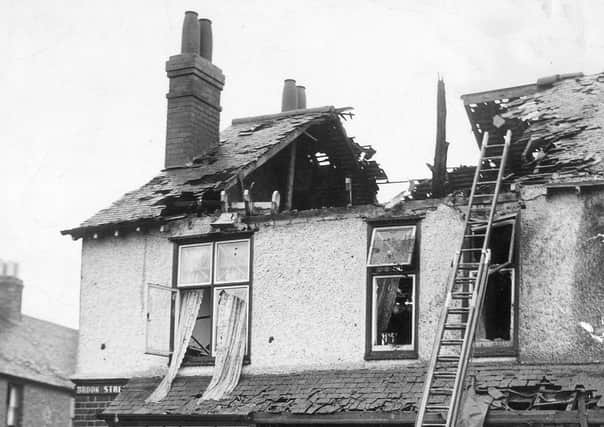

November 4, 1940, was a dreary, drizzly Monday morning. The start of a new week, housewives flitted Melton’s streets shopping for rationed food. Apart from an increase in uniforms in the town, the war seemed hundreds of miles away in the south, with London bearing the brunt of the Luftwaffe’s onslaught. Without warning, Melton’s apparent seclusion was suddenly about to disappear.
Air Ministry archives recorded: ‘Weather: rain, clouds 10/10 at 500ft. At 10.19hrs, Raid 14 crossed the coast via The Wash at Sutton Bridge at 6,000ft.’ It took 10 minutes for the raider to fly the 45 miles to Melton, where it circled at 1,000-3,000ft, then approached our unsuspecting town from the west.
Advertisement
Advertisement
“At Asfordby School, our class was in the playing field,” recalled Jean Read. “We heard an aeroplane and thought it was ours, but all of a sudden, it dived down and started firing its machine-guns at us. The teacher screamed at us to run for cover into the hedges, which we did. Luckily, none of us were hurt, but we were very frightened.”
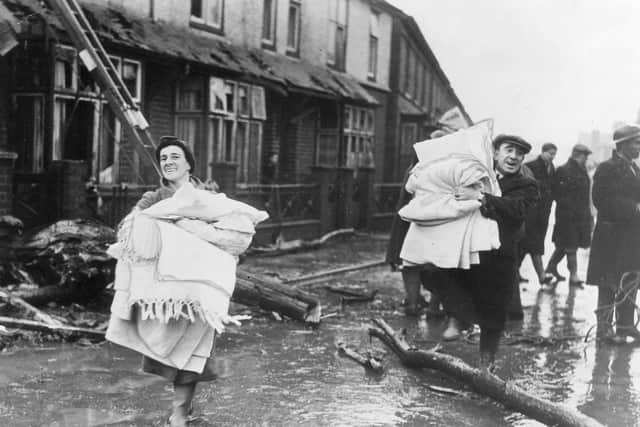

At 10.30am, the Junkers 88 bomber emerged from the clouds on its bombing run and machine-gunned streets from West Avenue to the town centre. London evacuee Mrs E. Raine was walking when a bullet grazed her leg. Mrs E.D. Hamer was grabbed by a passer-by and pushed into a shop doorway: a bullet had passed through her coat. Kathleen Garner recalled: “I was in the town centre, when I heard this plane coming. I had no idea it was a raider till a man pushed me into a shop doorway, shouting ‘Get off the street, it’s a German!’”
Charlotte Benton remembered: “There was this rat-a-tat-tat noise, then a man shouted ‘Get inside, get inside’. My friend, Mrs Richardson, came in and just fainted.”
Bullet scars were said to be visible on the George Hotel’s frontage for many years and a bullet passed through the roof of a house in Sherrard Street.
Advertisement
Advertisement
The Junkers dropped its heavy SC 1000kg ‘Hermann’ high-explosive bomb which landed in Thorpe End, wrecking a post office garage by Crosher’s Yard, which an eyewitness said ‘collapsed like a pack of cards.’
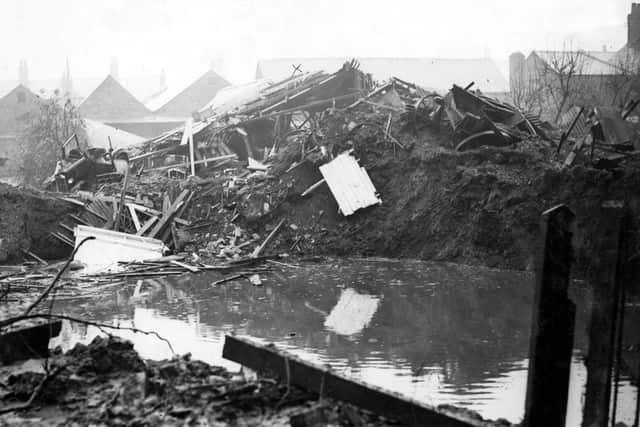

Sidney Smith, John Hollingshead, Robert Abel and Michael Farrell were working inside. Abel said: “I heard a machine-gun rattling and we ran outside, just in time to see a bomb released from the plane. Someone shouted ‘Take cover’ and three of us ran back into the garage, while Farrell crouched beside a wall. The explosion shook the garage and it came down on our heads. I was trapped beside a petrol pump. I saw daylight above me and managed to climb out above the wreckage. I was a bit dazed because a brick hit me on the head. I called out for the others. We found Hollingshead and got him out, but Smith had gone to the other end of the garage and was buried.”
Although rescued by ARP personnel, married GPO engineer Sidney Smith, aged 30, of Albert Street, died soon after admission to hospital. Under the censored headline of ‘Lone raider drops bomb on Midland Town’, the Melton Times poignantly noted: ‘Smith died in the front line of this war for freedom’. Hollingshead and Abel sustained minor injuries which were treated at hospital. Nine males, including five soldiers and six females, were also injured, some by flying glass. Three children were hurt, including one with a broken foot. Windows over a wide area were shattered.
Miraculously, much of the bomb’s huge blast had been absorbed when it fell in the Scalford Brook, although mud plastered surrounding properties inside and out. Bizarrely, a large willow tree in the farmyard of Mr R. Freeman was blasted over houses and crashed through the roof of 1 Brook Street, occupied by Mr and Mrs George Shaw, plus evacuees Mr and Mrs Kirkman, who had an extraordinary escape. The main trunk landed in the living room, with the branches between the two bedrooms. Dazed Mr Shaw said: “If we hadn’t been standing where we were, we wouldn’t be here now,” the Melton Times explaining: ‘On hearing machine-gun fire, the occupants’ curiosity impelled them to run into the kitchen to look. The chair Mr Shaw had just been sitting in was smashed to fragments by the tree.’ The Kirkmans, who, ironically, had fled to the safety of Melton from front line Dover, were both injured and hospitalised.
Advertisement
Advertisement
Neighbour Mrs Hamer recalled: “Someone told me ‘They’ve bombed Brook Street’. I lived at number 9 and my five-year-old son and grandparents were in the house, so I dashed home frantically. The brook saved us. I rushed into the street, through this thick mud to my home, and at first I couldn’t find my son. The soldiers billeted in the factory across the road had taken him in when the bomb dropped.”
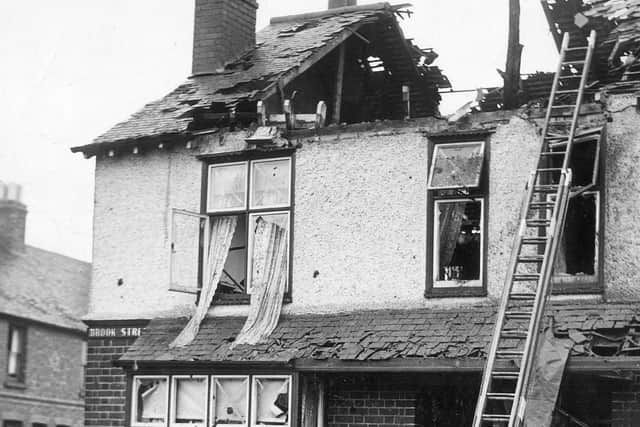

Another report noted: ‘By a miracle, the bomb fell into a brook, making a huge crater, which soon resembled a large pond. Two ducks were killed and under a pile of debris, a pig was discovered. Windows of the Wheatsheaf public house were blown in, but business soon returned to normal, with customers drinking toasts to celebrate their remarkable escapes. The feeling of resentment among the bombed residents is summed up by one man whose house suffered: ‘They can’t face up to a fair fight. They’ve got to bomb poor folks’ houses and machine-gun women and children.’
Leicestershire ARP officer, James McDougall, reported: ‘Although the sirens had not sounded, the ARP services were quickly on the spot. Many residents had to be temporarily billeted and furniture stored. By nightfall, all those affected were properly cared for. Melton received a shock, but public morale was unaffected and the value of the ARP services rose high in the people’s estimation.’
Days later, the ARP recorded a lethal legacy of the attack: ‘Enemy cannon shell. Looks solid and unexploded. Reports Melton schoolchildren have some in their possession.’
Advertisement
Advertisement
So, why did the Luftwaffe target Melton, a quiet country town? The Battle of Britain had ended four days previously. After heavy losses, the Luftwaffe had switched to the night bombing of London. However, German High Command tried to maintain some daytime pressure with single aircraft attacks under the cover of poor weather. Titled störflug or harassing attacks, they aimed to disrupt British war production and lower public morale.
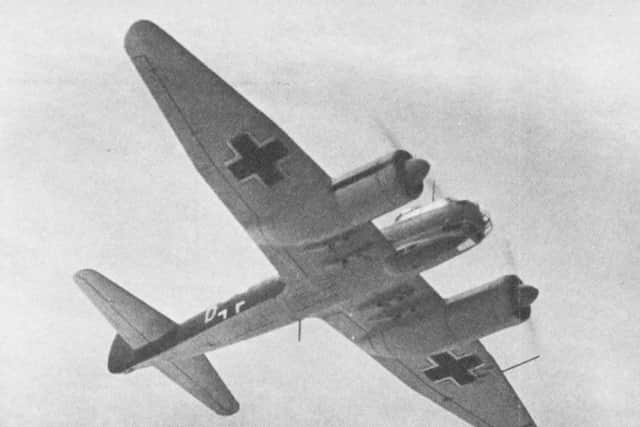

Holwell ironworks had been targeted a month earlier. The Junkers may well have been trying to find the works again, but due to cloud cover, instead spotted and attempted to attack Melton’s gas works – an equally attractive prize. The Luftwaffe classed gas works as key targets: if incapacitated, a whole area’s domestic supply and more importantly, industrial production, could be disrupted.
Just two months earlier, a lone raider had tried to bomb Leicester’s gasometers and also missed, again causing collateral casualties. This time, the raider’s one-tonne bomb had fallen short of Melton’s gasometer at the far end of Brook Street. A large fragment of the bomb is now displayed in the Carnegie Museum, just yards from where it fell.
As for the bomber, possibly of the Luftwaffe’s KG 54 ‘Death’s Head’ unit, it was ‘the one that got away’. Although the Air Ministry noted the Junkers had been engaged with Lewis Gun and rifle fire by two searchlight sites, including at Nether Broughton, and ‘appeared to be in trouble, flying at under 100mph throughout the action’, the raider was plotted exiting at King’s Lynn, near where it had arrived, ‘without RAF interception.’
Advertisement
Advertisement
In the whole war, Melton suffered just one significant raid, by one aircraft, with one bomb and one fatality.
In some cultures, one is viewed as neither a lucky or unlucky number: for Melton, the raid was distressing - but it could have been a lot worse.